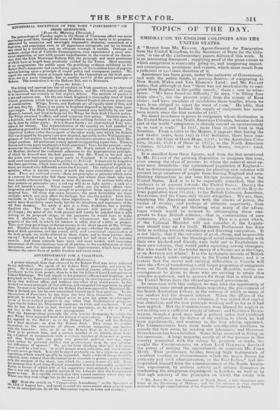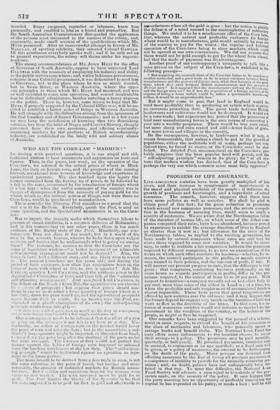TOPICS OF THE DAY.
EMIGRATION TO ENGLISH COLONIES AND THE UNITED STATES.
A " Report from Mr. ELLIOT, Agent-General for Emigration from the United Kingdom, to the Secretary of State for the Colo- nies," is one of the earliamentary papers delivered this week. It is an interesting document ; supplying proof of the great extent to which emigration is constantly going on, and suggesting import- ant consequences, proximate and remote, which must result from a judicious or mistaken direction of it.
Assistance has been given, under the authority of Government, and with the public funds, to persons desirous of emigrating to New South %Vales and Van Diemen's Land ; and Mr. Ewal. states' that although at first "there was not much alacrity to emi- grate from England in the public vessels," there a- now no reluc- tance. " We have found no difficulty," he says, " in filling four ships alreail v, (in the present year,) from the county of Kent alone ; and have numbers of candidates there besides, whom we have been obliged to reject for want of room." He adds, that "from Scotland and Ireland the supply of emigrants has never been scanty since the first months of 1837."
No direct assistance is given to emigrants whose destination is the United States or the North American Colonies, because to that part of the world " emigration is already carried on spontaneously on so %est a scale: In 1837, more than 66,000 went in that direction. From a table in the Report, it appears that during the last twelve years, from 1825 to 1837 inclusive, there have emi- grated to the Cape of Good Hope, 2,939; to the Australian Colo- nies, 28,642, (5,(J54 of' these in 1437); to the North American Colonies, 363,129 ; and to the United States, 300,259 ; total, 694,969.
It is manifest from these figures, and from the fact mentioned by Mr. ELLior of the growing disposition to emigrate this year, even among the class of persons to whom the removal must ap- pear most formidable—the agricultural population of England— that no discouragement of schemes for planting new colonies will prevent large numbers of people from leaving England and esta- blishing themselves in our own foreign possessions, or in the United States. And it is to be especially remarked, that the tendency is at present towards the United States. During the last three years, the emigrants who have gone to swell the Repob- lican population were 101,264; to the British Colonies, American, Australian, anti the Cape, only 90,665 altogether. %Ve are, then, supplying the American nation with the sinews of power, the means of rivalry, anti perhaps of ultimate superiority, from our own vitals, We are throwing away many of the advan- tages which would be secured by encouraging these emi- grants to form Britishh colonies,—that is, communities of sure customers, allies, and fellow citizens. This is a point which, if the Colonial Minister will not consider it, the Legisla- ture should take up for itself. Hitherto, Parliament has done little or nothing towards regulating and directing emigration. It is not likely, that if the certainty of good, cheap, and -responsible government, as well as the blessings of social companionship with their own kindred and friends, were held out to Englishmen in their own colonies, they would prefer squatting among strangers. But who would be at the tender mercy of a SostansaT at the Cape, or an ARTHUR any where? It is the systematic misrule of British Colonies which sends emigrants to the United States • and it is certain that the recent and existing difficulties in Canada will have the effect of transferring a still larger proportion of emigrants from our North American provinces to the Republic, unless en- couragement be given to those who are striving to retain this valuable population, and to procure for them that in which alone the United States have the advantage—good government.
In connexion with this subject, we may take the opportunity of mentioning some recent proceedings respecting the government of the South Australian Colony, in the success of which so many of our readers feel the deepest interest. When the affairs of the colony were last noticed in our columns, it was stated that capital was abundant, anti the new principle working well as far as it had been applied. But the Commissioners were blamed for neglect in not sending out a sufficient supply of labour; and Governor H IND■ MARSH, Ihnough a good mail and a gallant sailor, had exhibited extreme unfitness for the duties of the station, to which he had been injudiciously, and contrary to the best adri2e, appointed. The Commissioners have since made considerable exertions to remedy the first error, by sending out labourers; and Governor II itinmARSH has been recalled. Some delay occurred in fixing on his successor. A large majority, nearly all 'of the persons in this country connected with the colony by property or trade, be- sought the Commissioners, on whom Lord GLENELG devolved the power of making the appointment, to nominate Mr. JOHN Hum That gentleman, besides bearlog high testimonials of
excellent conduct in circumstances which try men's fitness for authority and civil administration, in the East Indies,* had dis- titiguished himself from the commencement of the South Austra- lian experiment, by zealous activity and urbane discretion in conducting the emigration department in Loudon, as well as by thor ugh mastery of the principles on which the colony was
• Mr. JOIIN Hrrr was Governor of North Arcot, a very important pro- vince in the Presidency of Madras ; and for his cervices in that capacity received the high commendation of the Supreme Government in India. founded. Every emigrant, capitalist or labourer, knew him personally, and confided in him as a friend and counsellor. But the South Australian Commissioners disregarded the application of the persons most interested in the success of the colony, and, apparently, made small account of the qualifications which Mr. HUTT possessed. After an unsuccessful attempt in favour of Mr. BARCLAY, of sporting celebrity, they selected Colonel GAWLER. Of this gentleman everybody speaks well ; and if he only act up to general expectation, the colony will thrive under his superin- tendence.
The strong recommendations of Mr. JOHN HUTT for the office of Governor of South Australia, appear to have impressed Lord GLENELG with the necessity of employing his industry and ability in the public service somewhere; and, with a ludicrous perverseness, common in our Colonial government, it was determined to send him as Governor, not to the place where he was so much wanted, but to Swan River, or NVestern Australia, where the oppo- site principles to those which Mr. MUTT bad mastered, and was so well qualified to carry into operation, had caused incalculable loss to individual adventurers, besides entailing a heavy expense en the public. There is, however, some reason to hope that Mr II UTT, if properly supported by the Colonial Office now, will be en- abled to establish a better order of things in Western Australia. He will struggle with the difficulties arising from the ignorance of the first fouuders and of former Governments; and in a few years we may have the satisfaction of knowing that two flourishing colonies, free from the taint of Negro and Convict Slavery, cheaply Roverned front their own resources, and offering constantly- increasing markets for the products of British manufacturing industry, are established on the lately wild and solitary shores ef Australia.



























 Previous page
Previous page